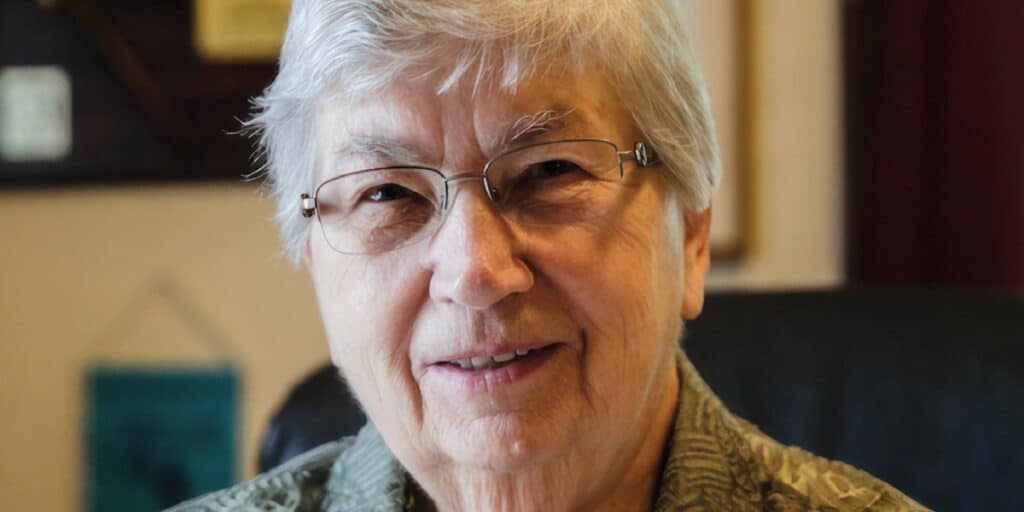She’s talked to murderers, abusers, and even those wrestling with the occult. Sister Mary Frances Seeley and volunteers answer all calls with a message of God’s unconditional love and prayerful support.
Sometimes life can be scary, lonely, and wild. Katarina Moberg, 36, of Sweden, knows that all too well. In the summer of 2022, her mother was diagnosed with a rare and aggressive form of cancer. Moberg, a nurse, moved in to care for her mother, in effect becoming her private-duty nurse. When the stress of watching her mother die and being on call 24/7 became too much for her to bear, Moberg sought help.
“I searched online, and for some reason the Upper Room Crisis Hotline (TURCH) came up. Sweden is a Protestant country, and my family was not religious, but I emailed the contact at the hotline and poured out my heart. They got in touch with me and said they were there to listen. I think for the first hour on the phone, I just cried,” says Moberg, who speaks excellent English as well as six other languages. Since then, a volunteer from the hotline has contacted her weekly, supporting her through her mother’s illness, death in March 2023, and accompanying grief.
“I had never had anyone tell me that they were praying for me before,” says Moberg. “I was an agnostic, and religion was always laughed upon here. We only believe in science, but this experience—my mother’s passing and the unconditional love and support I’ve felt coming from the Upper Room Hotline—has convinced me that there’s something more, and I’ve begun to search for God. I’ve begun to wear my Finnish great-grandmother’s silver cross, and I’ve even made myself a rosary from yarn.”
Moberg refers to her contact at TURCH and the staff as her “guardian angels.” “However, my family’s English is so-so,” she says, “and they don’t always translate things properly. I have a dedicated ringtone to alert me when my Upper Room contact is calling. When they hear that, my family exclaims, ‘It’s your saints in the wild.’”
A First in Crisis Hotlines
TURCH, whose tagline is “God’s love has a toll-free 800 number,” is a free, confidential, faith-based hotline in the Catholic tradition. The toll-free number is 1-888-808-8724. It was founded in Joliet, Illinois, by Sister Mary Frances Seeley, OSF, who has a PhD in law, policy, and society and an extensive background—50 years—in crisis hotlines. The nonprofit was incorporated in March 2007 and began taking calls on January 1, 2008.
“I had started two public crisis hotlines back in the 1970s, and the Priests Council of Chicago knew of my work and asked me to set up a hotline for priests and religious,” says Sister Mary Frances. The clergy sexual abuse scandal had come to light, and the hotline was founded to help priests and religious who were also grappling with the scandal. “I believe this was the first faith-based hotline in the country, and somehow the laity found out about it, and we began getting calls from them. In 2013, the hotline was officially opened to anyone,” says Sister Mary Frances, who recently celebrated her 75th jubilee as a Franciscan and is writing a book about her experiences as a pioneer in crisis hotlines.
In 2019, Sister Mary Frances “retired,” although she still serves as president of the hotline’s board of directors and as a special advisor. Terry Smith, PhD, who has over 40 years’ experience in special education and mental health, became TURCH’s executive director.
“Our most recent monthly data shows that we took 625 calls, so when you multiply that by 12, we receive approximately 7,500 calls a year,” says Smith. During one month, nearly half of the calls that the hotline received (48 percent) were from people simply needing to talk with someone, 35 percent were asking for prayer, 27 percent were dealing with mental health issues, and 22 percent were suffering from isolation and loneliness. Fifty-eight percent of the callers were males, with 62 percent professing to be Catholic. In addition to the hotline, 140–150 emails were received and responded to by volunteers.
“I describe the issues people call about as being a microcosm of life. They are dealing with anxiety, depression, diagnosed mental illness, and just the difficulty of coping with life,” says Smith. “Many people are simply suffering from isolation and loneliness. We also get lots of calls asking for prayers, and our counselors will pray with them; we have a list of prayers appropriate for the caller’s specific need.”
TURCH’s mission is to “emulate Christ through the guidance of the Holy Spirit,” reflecting seven pillars of caring support, including spiritual support and prayer, focused and reflective listening, empathy, compassion, nonjudgment, affirmation, and patience. Callers lead the discussion, and the phone counselors serve as facilitators to respond to those needs. TURCH supports people of faith and no faith and refrains from proselytizing. “We do not try to convert anyone but to respect their religious traditions,” says Sister Mary Frances. “If the caller asks for information about the Catholic faith, we freely talk to them about it.”
“Our volunteers are trained to provide focused and undivided attention through reflective listening, and spiritual support and prayer are offered when requested,” says Smith. Phone counselors also are trained to respond to callers at risk for suicide or other crisis situations to provide immediate support or intervention and referrals.
Ongoing Support for Callers
The hotline continues to expand and has received calls from all over the United States as well as 35 other countries. Most callers speak English, but several volunteers speak Spanish.
Unlike other crisis hotlines, TURCH can provide continuing support. As part of the Extended Caller Support Program, a volunteer can call on a weekly basis for an extended period. Over the past four years, 10 callers—from across the United States, Sweden, and the Philippines—have received extended caller support. “We provide support and get to know our callers, developing a rapport. One benefit of this is that it eliminates the caller from having to repeat their problems anew each time they talk to a volunteer,” says Smith.
In 2019, right before the COVID-19 pandemic, TURCH “fortuitously” changed its phone system, Smith says. “Otherwise we would have had to shut down the hotline. That would have been catastrophic, as we saw feelings of isolation and loneliness increase as well as a rise in stress. Parents were trying to work while dealing with children being sent home to learn remotely. They were trying to cope and make adjustments. There was a lot of change in a short time.
“Many also felt cut off from the faith as religious services were curtailed, and they had no access to the sacraments. Some callers felt that their faith was faltering. And obviously, the medical issues of dealing with COVID made people more fearful and anxious.”

Sister Mary Frances Seeley, OSF, who has 50 years of experience in handling crisis calls, is the founder of the Upper Room Crisis Hotline.
The volunteers who staff the hotline are highly trained. Prior to the change in phone systems, all training was done on site, and calls went through a central Upper Room line center. This limited the number of callers they could help. Now training is done remotely, and volunteers can receive calls on their cell phones, which has opened volunteer opportunities for more people. The hotline has approximately 70 volunteers, including staff, but about 45–50 active volunteer phone counselors.
Training sessions are offered two to three times per year and run for eight weeks, with two sessions per week. “We get constant feedback from volunteers, and many have said it is like a graduate class,” says Smith.
Sharing God’s Unconditional Love
“Ella” (not her real name) has been counseling callers for two years. “I took a four-year Biblical Institute Course and kept in touch with my instructor. She emailed me about TURCH needing volunteers and suggested I look into it,” says Ella, who prayed extensively about it, wondering if it was something to which she was suited. “I don’t have a background in counseling or mental health, but I was involved in my parish, talking and helping people who were dealing with issues. As I was discerning if I wanted to volunteer, I felt I was almost compelled by the Holy Spirit to do it.”
Although Ella felt very well-prepared when she began counseling, she was understandably nervous when she answered her first call. “Before I picked up that first call, I prayed to the Holy Spirit to guide me and give me the words to say. I have done that every time since. It works, and the Holy Spirit has not failed me.”
“I have learned so much from my callers,” says Ella. “I listen to them and affirm them. No matter what issues they are dealing with, I invite them to pray with me and strive to bring them to a deeper relationship with the Lord. We have very good conversations and develop relationships. Since we are not seeing each other face-to-face, our words are the most important. We deal in words,” says Ella. She estimates that 97 percent of her callers are Catholic, but the hotline receives calls from Protestants, Jews, and to a lesser extent atheists and agnostics. “That’s what we do,” says Ella. “We help by offering support, compassion, and nonjudgment to each caller because the Lord’s love is in our hearts, and it is purely unconditional.”
For anyone who feels they may be called to be a hotline volunteer, Ella encourages them to pray about it and take the training course, where further discernment will confirm whether it’s in God’s plan for them. “It’s a commitment, but there is a lot of support for the volunteers,” she says. “Sometimes we get very tough calls like those dealing with domestic violence, alcoholism, addiction, thoughts of suicide, but we are well-trained and have resources to assist them. I take the Lord’s words ‘Do not be afraid’ to heart.”
The hotline is always seeking volunteers. “I conduct an initial interview of prospective volunteers, and I ask for a letter from their Church official attesting that they are a Catholic in good standing and have a heart for serving others,” says Smith. Volunteers also write a short autobiography and “we evaluate them throughout training, to see if this is a mutually beneficial situation,” says Smith. “We make sure our volunteers have a strong ethic, strong faith, and a heart to serve others.”
Jean Haas, TURCH’s director of marketing, says most people find out about the hotline by searching the Internet or by referral. “Our website is our most important tool. We often have new videos on our website and Facebook page. Unfortunately, Facebook is not that favorable toward us, but search engines rank the website high,” says Haas.
TURCH raises funds through online donations and Amazon’s affiliate program. “When you make a purchase through our link with Amazon, a portion of that purchase is donated to us,” says Haas, who points out that no one who calls the hotline is charged a penny. All donations go directly to pay the phone bills, office supplies, etc., and no one benefits financially from the hotline. Everyone is a volunteer, including the staff, Smith, Haas, and Sister Mary Frances.
No Calls Go Unanswered
This support has allowed the Upper Room Crisis Hotline to expand. In addition to its Extended Caller Support Program, from which Moberg benefited, the hotline also operates the Sunshine Program for retired clergy with medical issues. “We do a daily wellness check on them, and currently we have one priest in Michigan participating in the program,” says Smith.
The hotline receives many requests from callers asking for spiritual direction or guidance from a priest. Therefore, the hotline has instituted a Priest on Call Program, where callers can discuss struggles with their faith, questions about the faith, and receive help from a priestly perspective. All callers need to do is phone the hotline and ask to speak with a priest. The caller’s name and phone number are then taken, and a priest calls them back, generally within the same day. All of this is done under a cloak of anonymity. “Some callers have doctrinal questions, some have relationship difficulties, some are feeling they are being demonically influenced,” says Smith. “The priest can counsel but cannot do confession over the phone.”
Prayer is an integral part of the hotline. In addition to the prayers offered by the volunteers, the Poor Clare Colettines, a group of cloistered nuns in Minooka, Illinois, offer prayers twice daily for TURCH and pray specifically for callers and their intentions when requested.
For those who are struggling but reluctant to call, Sister Mary Frances says: “Do not hesitate. We are not shocked and are well-trained to help. I’ve talked to murderers, sons who have been sleeping with their mothers, abusers, and I’ve even dealt with the occult. One young man called the hotline terribly frightened, and he explained to me that he was scared because he had abandoned God and had invited Satan in. At first, things were going well for him, but now they were deteriorating. In the middle of the call, I heard an ugly voice say, ‘He’s mine. He’s mine. He’s mine.’ I asked the caller if he heard anything unusual on his end of the line, but he said no. So, I simply said, ‘Satan, go back to hell where you belong.’”
Afterward, Sister Mary Frances contacted her bishop for guidance, and he had her undergo deliverance training. “I’m not an exorcist, but we can even help with those dealing with demonic influences.”
Yes, life can be scary, lonely, and wild, but thankfully, there are “saints in the wild” at TURCH who can help those in need navigate this world.
You can reach the Upper Room Crisis Hotline toll-free at: 1-888-808-8724. To learn more, how to become a volunteer, or donate, visit CatholicHotline.org, the Upper Room Crisis Hotline Facebook page, or send an email to CatholicHotline@gmail.com.









1 thought on “The Upper Room Crisis Hotline ”
I’m going through a spiritual death and need someone to talk to.